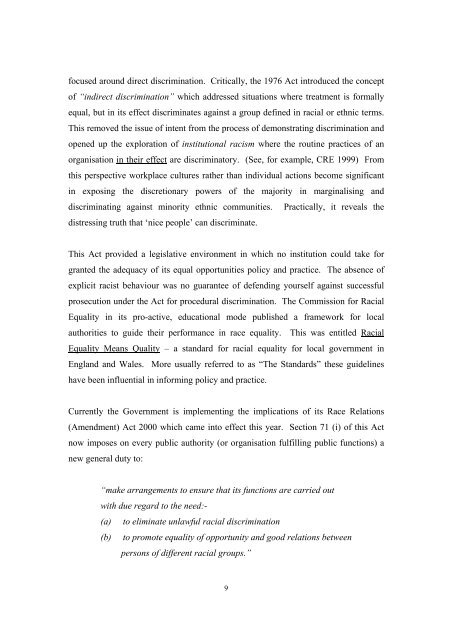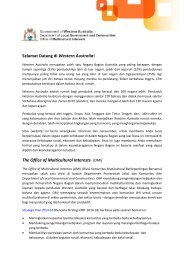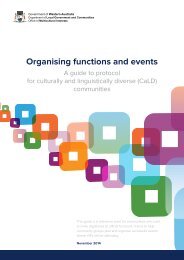Doing good by stealth, whilst flirting with racism - Office of ...
Doing good by stealth, whilst flirting with racism - Office of ...
Doing good by stealth, whilst flirting with racism - Office of ...
Create successful ePaper yourself
Turn your PDF publications into a flip-book with our unique Google optimized e-Paper software.
focused around direct discrimination. Critically, the 1976 Act introduced the concept<br />
<strong>of</strong> “indirect discrimination” which addressed situations where treatment is formally<br />
equal, but in its effect discriminates against a group defined in racial or ethnic terms.<br />
This removed the issue <strong>of</strong> intent from the process <strong>of</strong> demonstrating discrimination and<br />
opened up the exploration <strong>of</strong> institutional <strong>racism</strong> where the routine practices <strong>of</strong> an<br />
organisation in their effect are discriminatory. (See, for example, CRE 1999) From<br />
this perspective workplace cultures rather than individual actions become significant<br />
in exposing the discretionary powers <strong>of</strong> the majority in marginalising and<br />
discriminating against minority ethnic communities. Practically, it reveals the<br />
distressing truth that ‘nice people’ can discriminate.<br />
This Act provided a legislative environment in which no institution could take for<br />
granted the adequacy <strong>of</strong> its equal opportunities policy and practice. The absence <strong>of</strong><br />
explicit racist behaviour was no guarantee <strong>of</strong> defending yourself against successful<br />
prosecution under the Act for procedural discrimination. The Commission for Racial<br />
Equality in its pro-active, educational mode published a framework for local<br />
authorities to guide their performance in race equality. This was entitled Racial<br />
Equality Means Quality – a standard for racial equality for local government in<br />
England and Wales. More usually referred to as “The Standards” these guidelines<br />
have been influential in informing policy and practice.<br />
Currently the Government is implementing the implications <strong>of</strong> its Race Relations<br />
(Amendment) Act 2000 which came into effect this year. Section 71 (i) <strong>of</strong> this Act<br />
now imposes on every public authority (or organisation fulfilling public functions) a<br />
new general duty to:<br />
“make arrangements to ensure that its functions are carried out<br />
<strong>with</strong> due regard to the need:-<br />
(a) to eliminate unlawful racial discrimination<br />
(b) to promote equality <strong>of</strong> opportunity and <strong>good</strong> relations between<br />
persons <strong>of</strong> different racial groups.”<br />
9










